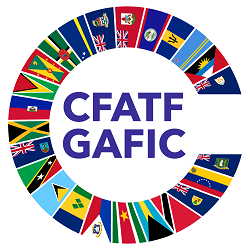
The Caribbean Financial Action Task Force is an organisation of twenty-five (25) states of the Caribbean Basin, Central and South America, which have agreed to implement common countermeasures to address money laundering. It was established as a result of meetings convened in Aruba in May 1990 and Jamaica in November 1992.
In Aruba, representatives of Western Hemisphere countries, in particular from the Caribbean and Central America, convened to develop a common approach to the phenomenon of the laundering of the proceeds of crime. Nineteen recommendations constituting this common approach were formulated. These recommendations, which have specific relevance to the Region were complementary to the original forty recommendations of the Financial Action Task Force (FATF) established by the Group of Seven at the 1989 Paris Summit.
The Jamaica Ministerial Meeting was held in Kingston in November 1992. Ministers issued the Kingston Declaration in which they endorsed and affirmed their governments’ commitment to implement the FATF and CFATF Recommendations, the OAS Model Regulations and the 1988 UN Convention. They also mandated the establishment of the Secretariat to co-ordinate the implementation of these objectives by CFATF member countries.
The main objective of the CFATF is to achieve effective implementation of, and compliance with, the FATF recommendations to prevent and control money laundering and to counter the financing of terrorism and proliferation of weapons.
The Secretariat has been established as a mechanism to monitor and encourage progress to ensure full implementation of the Kingston Ministerial Declaration and is presently hosted by the Government of Trinidad and Tobago. The CFATF Membership includes the following:
- Antigua and Barbuda
- Anguilla
- Aruba
- Bahamas, The
- Barbados
- Belize
- Bermuda
- Cayman Islands
- Curacao
- Dominica
- Grenada
- Guyana
- Haiti
- Jamaica
- Montserrat
- St. Kitts and Nevis
- Saint Lucia
- St. Maarten
- St. Vincent and the Grenadines
- Suriname
- Trinidad and Tobago
- Turks and Caicos Islands
- United States of America
- Venezuela
- Virgin Islands (British)
The Cooperating and Supporting Nations (COSUNs) are members of the FATF and as such are committed to the 1988 UN Convention Against Illicit Traffic in Narcotic Drugs and Psychotropic Substances and to the implementation of the 40 FATF Recommendations concerning anti-money laundering measures.
COSUN countries include:
- Canada
- France
- Mexico
- The Kingdom of the Netherlands
- Spain
- The United Kingdom
These nations recognise the relationship between the work and objectives of both the FATF and the CFATF.
Accordingly, they are committed to making such contributions to the work and/or resources of the CFATF as permitted by their respective national laws and policies.
The CFATF Secretariat undertakes the following activities on behalf of the CFATF membership:
- An ongoing programme of the Mutual Evaluation of Members.
- Co-ordination of, and participation in, training and technical assistance programmes.
- Bi-annual plenary meetings for technical representatives.
- Annual Ministerial Meetings.
The CFATF Secretariat also works closely with many international organisations, some of which include:
- CARICOM
- The World Bank (WB)
- The International Monetary Fund (IMF)
- The Caribbean Development Bank (CDB)
- The Commonwealth Secretariat
- The Eastern Caribbean Central Bank (ECCB)
- The Inter-American Development Bank (IDB) and
- United Nations Office on Drugs and Crime (UNODC)
The CFATF Chairmanship for the period December 2024 to November 2025 is held by Jamaica, represented by the Honourable Fayval Williams, Minister of Finance and The Public Service. The CFATF Deputy Chairmanship for the period is held by Barbados, represented by the Honourable Dale D. Marshall, S.C. The CFATF Immediate Past Chair for the period is held by Aruba, represented by Mr. Milángelo (Angelo) Brete, Director at Financial Intelligence Unit of Aruba.
The Executive Director of the CFATF is Ms. Dawne Spicer.
